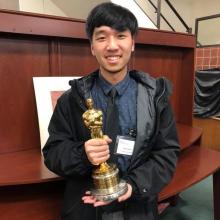Major: Cinema & Media Studies
Class of 2018
Hometown: Irvine, California
Internship: Northwest Film Forum
Next step: Graduate school at USC
Professor Stephen Groening sat down with Ryan Swen to ask about his work as a film critic, his internship at NWFF, and his interest in doing graduate work in Cinema and Media Studies.
UPDATE: Ryan will be attending graduate school at the University of Southern California. Congratulations, Ryan!
Stephen Groening: What made you want to go to UW, and why did you want to be a CMS major?
Ryan Swen: I came here with the intention of becoming a computer science major. I knew that UW was one of the best schools in the country for that field, but quickly realized that my mind was more geared towards the humanities. I had developed a passion for film during high school, and even while I was deciding on colleges I had in mind the possibility of majoring in cinema studies. My decision to switch was motivated both by my misgivings about CS and my wish to excel in a field that I was truly passionate about.
SG: What made you develop a love for cinema?
RS: My love for film came out of my abiding obsession with lists. When I discovered the American Film Institute’s list of top 100 films, I watched as many of those as I could. On the website “They Shoot Pictures, Don’t They?” I found a list of world cinema compiled from various sources, and the sheer variety of films (in contrast to the AFI canon) drew me into film studies.
SG: That reminds me of your podcast. Can you talk a bit about that?
RS: My podcast is called Catalyst and Witness. It’s about the New York Film Festival and is co-hosted by my friend Dan Molloy. The plan is to explore the entire history of the festival – starting in 1963 and covering a year per monthly episode – by watching and discussing as many of the films that played in the festival as possible.
SG: And you review films for other venues online as well, correct?
RS: Yes. I am a member of the Seattle Film Critics Society, and my main outlet is Seattle Screen Scene, which is run by Sean Gilman. I also write for The Film Stage and have done work for other websites in the past such as the Brooklyn Magazine Film Section.
SG: How did you get involved with these websites, given that the podcast is your own initiative?
RS: It was mostly a matter of reaching out and corresponding with the editors of these sites, but the real key was refining my critical voice. In 2015, I began writing two-sentence blurbs on everything I saw. Gradually, I became more and more comfortable with conveying my thoughts in an intelligent manner, and only sent my emails of introduction (along with writing samples) when I was ready, after about a year of practice.
SG: Did the CMS major help you in terms of writing about film?
RS: Yes, it did, to a certain extent. When I started, I was just taking cinema courses as electives, and even that helped. Over time, my progress in the major began to parallel my progress in writing, with each supporting the other.
SG: What is your favorite part of being a CMS major?
RS: I think it is being exposed to different ways of thinking about film. With you, for example, I’m taking a course on new media, and putting these perspectives and writings into my tool kit is immensely rewarding.
SG: This year, you applied to graduate programs in cinema studies. Any advice for majors who are interested in doing graduate work?
RS: Start early and have a clear intention. Remember that you need a writing sample. For that, it’s best to choose a topic that genuinely interests you, because it affects your ideas and how they develop through writing. If you have anyone who could look over your application in advance, especially your statement of purpose, consulting them is absolutely essential.
SG: You’ve interned at Northwest Film Forum. How did you land that internship, and what kind of work did you do there?
RS: It was a similar process to asking for the writing positions. I emailed the executive director, who said that they had an opening. During the summer, I helped program the experimental shorts at last fall’s Local Sightings Film Festival, and I’m currently writing program descriptions for them on a volunteer basis. You have to seek out these opportunities, particularly at places that you’re already passionate about.
SG: Any thoughts about film-related opportunities on campus, or advice for majors in general?
RS: I’m part of two film-related clubs, the UW Film Club and LUX Film Production Club, and those are both excellent places, the former for building social connections and the latter for gaining resources on the production side. As for advice, talking to peers and especially faculty has been a key part of my development. You can learn a tremendous amount just from talking to professors after class.
SG: How about a list of your top five films for someone who is interested in the major but hasn’t yet taken a CMS class?
RS: Sunrise (F.W. Murnau, 1927), “Duck Amuck” (Chuck Jones, 1953), Sans soleil (Chris Marker, 1983), Trust (Hal Hartley, 1990), and Rebels of the Neon God (Tsai Ming-liang, 1992).
